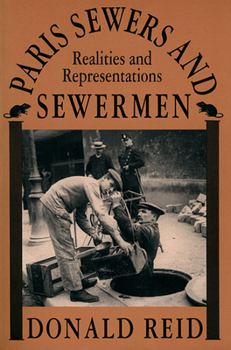Paris Sewers and Sewermen: Realities and Representations
Select Format
Select Condition 
Book Overview
The expansion of the Paris sewer system during the Second Empire and Third Republic was both a technological and political triumph. The sewers themselves were an important cultural phenomenon, and the men who worked in them a source of fascination. Donald Reid shows that observing how such laborers as cesspool cleaners and sewermen present themselves and are represented by others is a way to reflect on the material and cultural foundations of everyday life.
For bourgeois urbanites, the sewer became the repository of latent anxieties about disease, disorder, and anarchy. The sewermen themselves formed a model army of labor in an era of social upheaval in the workplace. They were pioneers both in demanding the right of public servants to unionize and in securing social welfare measures. They were among the first French manual laborers to win the eight-hour day, paid vacations, and other benefits. Reid transcends traditional categories by bringing together the infrastructure and the cultural supports of society, viewing technocracy and its achievements in technical, political and cultural terms. Historians of modern France, and Francophiles in search of the unusual, will welcome the cultural interfaces of urban history, labor history, and the history of technology his book provides. His text is enlivened by drawings and photographs of the life below Paris streets, and illuminated by references to literary sources such as Hugo's Les Miserables and Giraudoux's The Madwoman of Chaillot.Format:Paperback
Language:English
ISBN:0674654633
ISBN13:9780674654631
Release Date:January 1993
Publisher:Harvard University Press
Length:248 Pages
Weight:0.90 lbs.
Dimensions:0.8" x 6.2" x 9.2"
Customer Reviews
2 ratings
Symbolism of the Sewer
Published by Thriftbooks.com User , 19 years ago
This book is a history of the Paris sewer system, replete with the symbolism entailed by the sewer through the ages. It is divided into 3 parts: the sewers and their development, sewermen, and the sewermen's union. Reid traces the development of the sewer system from the times when waste collected in open pools, through the draining of the pools into the Seine and the eventual laws requiring private buildings to connect to the sewers. From almost the very beginning, the sewers needed workers to clear the sediment away and keep the sewage flowing, and Reid explains how the work of the sewermen, as the laborers in the sewer are called, changed over the course of time. Reid also discusses the sewermen's union and the efforts they made not only to assure the security and well-being of the workers, but also to take care of the workers' family members. The book is illustrated throughout with black-and-white photographs and drawings. Sources are referenced through extensive end notes. There is also an index. For Reid, the history of the sewer is found not only in the tunnels themselves and their dates of construction, but also in literature, particularly Victor Hugo's Les Miserables, and other similar works where the sewer has powerful symbolic meanings. While the book is quite interesting from the point of view of public health and city planning, it can be hard to follow at times for those who are not fluent in French, or not thoroughly familiar with Eighteenth and Nineteenth Century French literature and history. Reid leaves many quotes and key terms untranslated from French, assuming that the reader will be able to understand their meanings precisely. He often dates developments not with specific years, like 1825 or 1840, but by referring to such and such a date of the Second Republic, which is fine for those who have a good grounding in French history, but not always accessible to the general reader. Overall though, the book provides a very interesting perspective on an area of history that is often overlooked.
All I Ever Wanted To Know About Paris Sewers
Published by Thriftbooks.com User , 23 years ago
It's really hard to find information on paris sewers, whether it be on the internet or in books. Donald Reid's 'Paris Sewers and Sewermen' explains the history, neccessities, and the realities and representations of the sewers. I found everything I needed. The book also has many allusions to Les Miserables, and Dante's Inferno.






